Will independence improve press freedom in South Sudan?
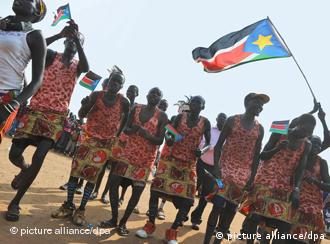 South Sudan is set to declare its independence from Khartoum on July 9, 2011.
South Sudan is set to declare its independence from Khartoum on July 9, 2011.
The citizens of the world’s newest nation have enormously high hopes for the future of their country. On July 9 a new anthem will be sung and a new flag will be raised, but essentially the country is starting from scratch.
Peace and security remain fragile and the international community will have to ensure that South Sudan does not become another failed state.
Against this background, will press freedom and conditions for journalists in a new South Sudan improve? Last year Sudan was again ranked as one of the worst countries in the Reporters Without Borders Press Freedom Index.
Press freedom in South Sudan was one of the major topics debated at the recent Deutsche Welle Global Media Forum. Here are few interesting points that emerged:
- Josephine Achiro, Programs Manager of Radio Bakhita, one of the most widely listened to radio stations in South Sudan said journalists are facing a lot of harrassment from security services and politicians. She also drew attention to the fact that international journalists have significantly more press freedom and access to politicians in South Sudan than local journalists.
- Kerstin Müller, Member of the German Parliament and Deputy Chairwoman of the Subcommittee for Civilian Crisis Prevention, said South Sudan first needs to build the structures that are needed for a democratic society and the international community needs to insist on a free media. Müller added that the Government of South Sudan needs to deliver on its promises.
- Manuela Römer, Media Trainer und Project Manager for South Sudan for the DW-Akademie, stressed that the media in South Sudan is perceived very negatively by authorities. Free media is “feared” and is seen as something which needs to be controlled. Römer pointed to the importance of engaging in a real dialogue on the role of the media – both with journalists and state officials. The DW-Akademie is therefore not only training journalists but also various other stakeholders, including officials in South Sudan’s Ministry of Information.
You can listen below to the full session and read more on this topic from DW’s Chiponda Chimbelu.
W21 – Promoting press freedom in Africa’s newest country – South Sudan by dwgmf
Médecine naturelle et mères abondonnées – Histoires Africaines au Maroc
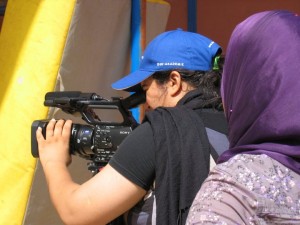 La première partie de notre grand projet “Histoires africaines – Reportages TV” (African Stories – read more in English) vient de se terminer. Neuf participants venant du Maroc, d’Algérie et de Tunisie y ont participé pendant les deux dernières semaines de juin. L’atelier s’est déroulé dans les locaux de l’ISIC (Institut Supérieure d’Information et de Communication), à Rabat au Maroc. Au cours de cet atelier, les participants ont travaillé en équipes nationales. Chaque équipe consistant en un opérateur, un monteur vidéo et un journaliste. Les trois membres de chaque équipe ont collaboré étroitement en effectuant ensemble le travail de recherche, la conception et la réalisation du reportage (du tournage jusqu’à la rédaction du manuscrit).
La première partie de notre grand projet “Histoires africaines – Reportages TV” (African Stories – read more in English) vient de se terminer. Neuf participants venant du Maroc, d’Algérie et de Tunisie y ont participé pendant les deux dernières semaines de juin. L’atelier s’est déroulé dans les locaux de l’ISIC (Institut Supérieure d’Information et de Communication), à Rabat au Maroc. Au cours de cet atelier, les participants ont travaillé en équipes nationales. Chaque équipe consistant en un opérateur, un monteur vidéo et un journaliste. Les trois membres de chaque équipe ont collaboré étroitement en effectuant ensemble le travail de recherche, la conception et la réalisation du reportage (du tournage jusqu’à la rédaction du manuscrit).
![]() read more
read more
Overcoming stereotypes
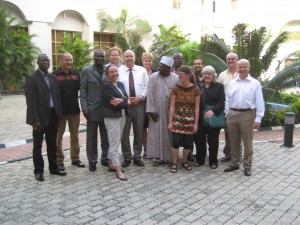 A group of Nigerian journalists met with a group of German journalists in Abuja, Nigeria. The purpose: learn more about the others’ country and discuss the existing perception of Germany and Nigeria.
A group of Nigerian journalists met with a group of German journalists in Abuja, Nigeria. The purpose: learn more about the others’ country and discuss the existing perception of Germany and Nigeria.
Germans drink a lot of beer, are self-confident and ecological while Nigerians are loud, tall and full of energy. Cliched stereotypes you might say? Perhaps, but discussing mutual stereotypes was a good starting point for the recent German-Nigerian Media Dialogue in Abuja, and cause for heated discussion and a lot of laughter among the participating journalists.
![]() read more
read more
Photographer from Bangladesh named winner of the “KLICK!” photo competition
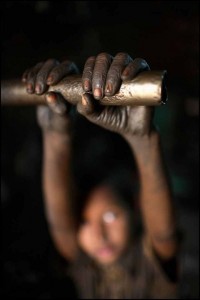 GMB Akash of Bangladesh won first place in the international photo competition called “KLICK! – Your View of Human Rights and Globalization”. The name of his winning picture is “Children’s Hands”. The contest was launched by Deutsche Welle and Amnesty International. The winning photographs were decided by around 1,500 participants at this year’s Deutsche Welle Global Media Forum in Bonn, Germany, which ended on Wednesday, 22 June 2011.
GMB Akash of Bangladesh won first place in the international photo competition called “KLICK! – Your View of Human Rights and Globalization”. The name of his winning picture is “Children’s Hands”. The contest was launched by Deutsche Welle and Amnesty International. The winning photographs were decided by around 1,500 participants at this year’s Deutsche Welle Global Media Forum in Bonn, Germany, which ended on Wednesday, 22 June 2011.
Of his winning shot, photojournalist GMB Akash says, “It shows eight year old Munna who works in a rickshaw factory in Dhaka, Bangladesh. The boy earns about 500 taka (7 U.S. dollars) a month, working 10 hours a day. When production often stops due to lack of electricity, he has time to play. It is common in Bangladesh for children of poor parents to work in various hazardous and labor-intensive
First Place Winner: “Children’s Hands” by GMB Akash
workplaces to support their families. Seventeen and a half percent of all children aged between 5-15 are engaged in economic activities. The average child worker earns between 400 to 700 taka per month, while an adult worker earns up to 5,000 taka per month.” One U.S. dollar equals about 70 taka.
![]() read more
read more
Different perspectives benefit all of society
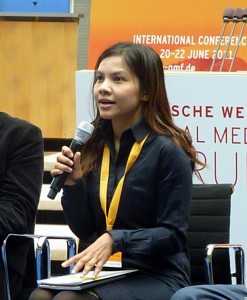 Media rights advocate Supinya Klangnarong from Thailand spoke during a panel discussion on advocacy versus objectivity at this year’s Deutsche Welle Global Media Forum in Bonn, Germany. The three-day conference in June focused on the role of the media in the context of human rights and globalization.
Media rights advocate Supinya Klangnarong from Thailand spoke during a panel discussion on advocacy versus objectivity at this year’s Deutsche Welle Global Media Forum in Bonn, Germany. The three-day conference in June focused on the role of the media in the context of human rights and globalization.
Klangnarong is vice-chair of the Campaign for Popular Media Reform (CPMR), a national NGO working towards the democratization of communication. She is also a board member of the Thai Netizen Network, an independent network of Internet citizens working to uphold cyber liberty in Thailand.
![]() read more
read more
Media’s role in communicating sustainable development
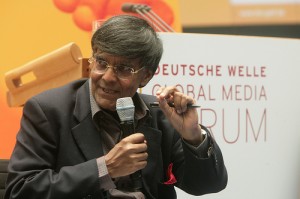 At this year’s Deutsche Welle Global Media Forum, which took place from June 20-22 in Bonn, Germany, sustainable development expert Mohan Munasinghe recommended that the media help spread the word to the world’s elite that it’s in their own interest to limit consumption and allow the poor to grow out of their poverty. In terms of resources, the “more the rich consume, the less there is for the poor,” he said. Otherwise the entire global system is at risk of collapse with unforeseen consequences for everyone.
At this year’s Deutsche Welle Global Media Forum, which took place from June 20-22 in Bonn, Germany, sustainable development expert Mohan Munasinghe recommended that the media help spread the word to the world’s elite that it’s in their own interest to limit consumption and allow the poor to grow out of their poverty. In terms of resources, the “more the rich consume, the less there is for the poor,” he said. Otherwise the entire global system is at risk of collapse with unforeseen consequences for everyone.
As vice chair of the Intergovernmental Panel on Climate Change, Mohan Munasinghe shared the Nobel Peace Prize with Al Gore in 2007. Currently he is chairman of the Munasinghe Institute for Development (MIND) in Colombo, a professor of sustainable development at the University of Manchester in the U.K., a distinguished guest professor at Peking University and honorary senior adviser to the government of Sri Lanka. He is widely recognized as having introduced a framework called sustainomics to make development more sustainable.
![]() read more
read more
Wikileaks: the right to know vs. the right to privacy
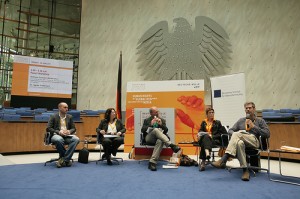
Deutsche Welle Global Media Forum 2011: Leaks, Wikileaks, whistleblower - New challenges for human rights?
This week a year ago, WikiLeaks founder Julian Assange first met with editors from the New York Times, the Guardian and Spiegel magazine to discuss how to investigate and publish hundreds of thousands of classified documents about the wars in Afghanistan and Iraq. The question at the heart of the meeting was how to reconcile the public’s right to know and the right to privacy of the people mentioned in the published logs by WikiLeaks?
Eric Schmitt, senior writer and Washington correspondent for the New York Times, gave an insider perspective on this crucial meeting at Deutsche Welle’s recent Global Media Forum. He says at the time, Mr Assange had not really thought through what impact the release would have for the individuals on the ground – especially in Afghanistan and Iraq, and had not made any plans to censor individual names.
So what responsibilities does the media have when it comes to protecting sources, and protecting people who may be put a risk as a result of leaked information?
Have a listen to the panel discussion between Dr. Agnès Callamard, Executive Director of the NGO ARTICLE 19, Eric Schmitt from the New York Times, Professor Beate Rudolf, Director of the German Institute for Human Rights and Jan Michael Ihl, spokesperson for Open Leaks.
You can also leave your comments within the timeline of the SoundCloud audio file.
W11 – Leaks, WikiLeaks, whistleblower – New challenges for human rights? by dwgmf
Reporting the mutinies and civil unrest in Burkina Faso
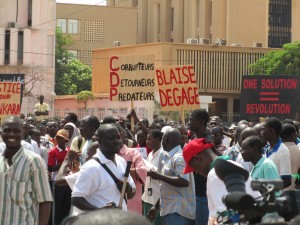 Journalists in Burkina Faso have faced difficult, dangerous and unpredictable conditions this year covering military mutinies, looting as well as civil unrest. The country has been gripped by a series of crises for several months. At least seven people including a young girl were killed when pro-government forces of President Blaise Compaoré quashed a mutiny in Bobo Dioulasso over May and June. This followed an earlier mutiny of soldiers in April. As a result of this violence, President Compaoré sacked top leaders of the military as well as his prime minister. The mutinies were preceded by violent student demonstrations in February. The protestors demanded justice after the killing of a university student in Koudougou, in the central-west of the country. Five police officers were charged with beating the student to death.
Journalists in Burkina Faso have faced difficult, dangerous and unpredictable conditions this year covering military mutinies, looting as well as civil unrest. The country has been gripped by a series of crises for several months. At least seven people including a young girl were killed when pro-government forces of President Blaise Compaoré quashed a mutiny in Bobo Dioulasso over May and June. This followed an earlier mutiny of soldiers in April. As a result of this violence, President Compaoré sacked top leaders of the military as well as his prime minister. The mutinies were preceded by violent student demonstrations in February. The protestors demanded justice after the killing of a university student in Koudougou, in the central-west of the country. Five police officers were charged with beating the student to death.
![]() read more
read more
Blocking Internet Access = Human Right Violation?
Against a background of the Arab Spring, a number of talks at the recent DW Global Media Forum focused on the importance of the Internet and social media networks during protests and popular uprisings, especially in Tunisia and Egypt.
But in their efforts to control information or suppress freedom of expression, some governments will try to block access to the Internet and mobile phone networks.
The United Nations has just issued a report saying that blocking Internet access may be a violation of human rights because it infringes on the freedom of expression.
This point was emphasised by Thorbjørn Jagland, Secretary General of the Council of Europe, during his keynote speech at the GMF.
“The Internet has become a space representing an unprecedented potential for freedom. Not only for the freedom of expression. It is now the main vehicle for democracy where people organise themselves and voice their opposition to government.”
Jagland added:
“We need a global instrument for this purpose, and I support the recent UN report’s call for access to the Internet as a globally recognised human right. I agree and we should start in Europe!”
So should access to the Internet be a human right? The DW-Akademie put that question to participants at the GMF.
Internet Access as a Human Right – GMF Vox Pop from DW Akademie – Africa on Vimeo
Photo credit: Deutsche Welle/K. Danetzki (some rights reserved 
 CC BY-NC)
CC BY-NC)
Video interviews: Chiponda Chimbelu
Tunisian blogger reflects on the Jasmine Revolution
Here in Bonn the Deutsche Welle Global Media Forum (#dw_gmf) is underway and includes the award ceremony for The BOBs – the DW International Blog Awards.
 This year’s winning blogger is Lina Ben Mhenni. The 27 year old university lecturer’s blog A Tunisian Girl was recognised for: “writing bravely about repression and censorship in Tunisia long before the international media descended on the country during the tumultuous events of December 2010 and January 2011.”
This year’s winning blogger is Lina Ben Mhenni. The 27 year old university lecturer’s blog A Tunisian Girl was recognised for: “writing bravely about repression and censorship in Tunisia long before the international media descended on the country during the tumultuous events of December 2010 and January 2011.”
Freelance DW-Akademie trainer, Sarah Mersch, spoke with Lina and asked her about the Jasmine Revolution and what changes she is now seeing in Tunisia’s media.
![]() read more
read more




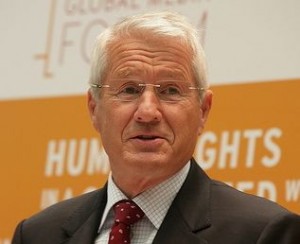




Feedback